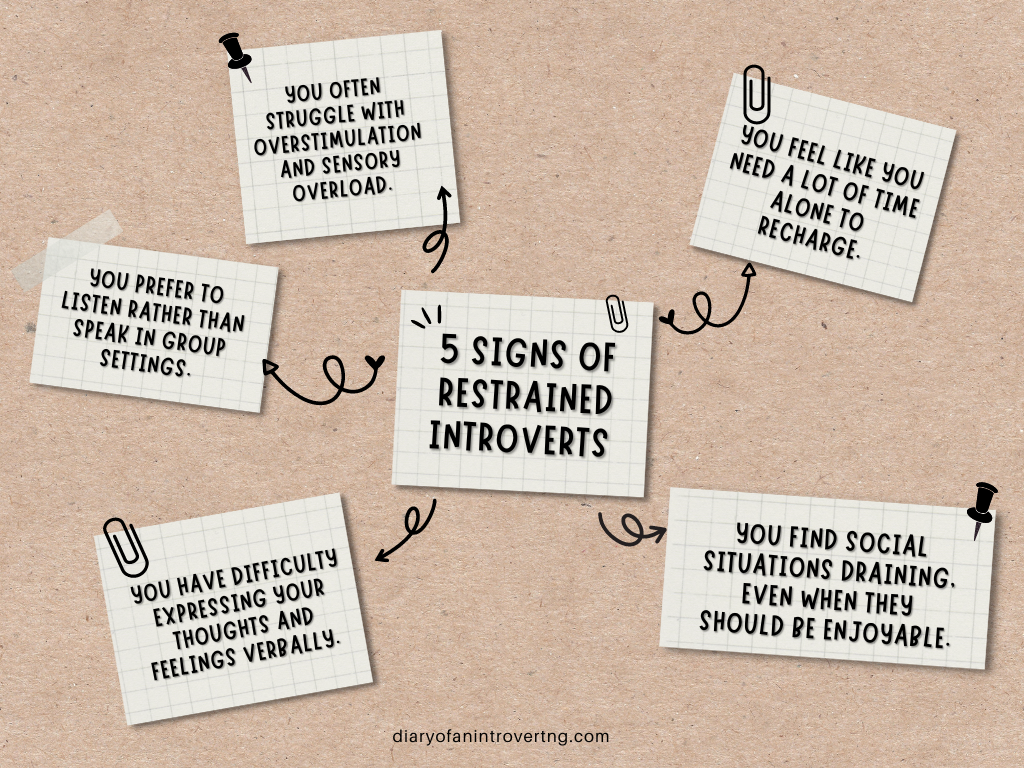Why Do I Talk to Myself? See 5 Amazing Facts of Every Introvert
I talk to myself - a lot! And that’s because I’m an introvert.
You must be wondering, “What is it called when you talk to yourself?” The process of talking to oneself is called self-talk.
Self-talk is an internal dialogue or inner voice that occurs within a person's mind.
This behavior is more prevalent in introverts because they are introspective and enjoy spending time alone.
Most quiet people tend to process information internally, that is, they think things through in their own heads rather than saying it or processing it with others.
This often involves self-talk, where they reflect on their thoughts, feelings, and experiences.
For example, let's say an introvert is getting ready to attend a social event. They might think things like, "Okay, I'm feeling a bit nervous, but that's normal. I've done this before, and I can do it again. I'll just take a few deep breaths and try to relax."
This is self-talk. It can help them feel more confident and prepared for social interaction.
After the social event, introverts may also engage in self-talk to reflect on how they interacted with others and to process any emotions that arose.
For example, they might think things like, "I had a good conversation with that person, but I wish I had spoken up more. Next time, I'll try to be more assertive."
This self-reflection can help introverts learn from their experiences and make adjustments for the future.
Overall, we should know that introverts tend to engage in more self-talk than extroverts because of their natural tendency towards introspection.
Is it normal to talk to yourself?
Yes, it is completely normal to talk to yourself.
Talking to oneself can be a helpful and healthy behavior.
Many people use self-talk as a way to organize their thoughts, plan out tasks, work through problems, or boost their confidence.
For example, self-talk can involve repeating positive affirmations to oneself, such as "I am capable" or "I am worthy."
On the flip side, it can also be negative, such as "I'm not good enough" or "I always mess things up."
Research has shown that the type of self-talk a person engages in can have a significant impact on their emotions, behavior, and performance. For example, I can talk myself out of a bad day, or into one.
People who engage in positive self-talk tend to have higher levels of self-esteem and better performance in various tasks.
On the other hand, people who engage in negative self-talk tend to have lower self-esteem, higher levels of depression, or poorer performance in various tasks.
Negative self-talk can also lead to self-sabotaging behaviors and a lack of motivation.
Fortunately, people can learn to change their self-talk patterns and develop more positive and supportive self-talk.
I talk to myself out loud when I need to replace negative thoughts with more positive ones. I also use it to practice self-compassion and self-care.
Why do I talk to myself out loud? Talking to yourself out loud can help with recognizing and challenging negative self-talk.
There are countless other helpful ways to improve self-talk patterns.
But, first, here are five positive facts about self-talk - plus how introverts can use it positively.
Fact #1: Self-talk helps introverts process their thoughts and emotions.
When introverts engage in self-talk, they have a sense of control over their thoughts and feelings, which in turn reduces anxiety and stress.
As an introvert, self-talk helps me work through my worries and fears to develop a more positive and empowered mindset. This can help me approach challenges with greater confidence, knowing that I have the inner resources to face whatever comes my way.
In short, self-talk is a powerful tool that can help introverts feel more in charge of their lives and more confident in their abilities.
So what causes talking to yourself?
Studies have found that self-talk can activate different parts of the brain, including areas associated with language processing, self-awareness, and emotional regulation.
This suggests that people who talk to themselves don’t just use it as a psychological tool. It has a physical impact on the brain.
So if you’re asking, “Why do I talk to myself?” This might be the reason. Your brain feels better when you talk to yourself.
Helpful Ways to Use Self-Talk for Emotional Regulation
Try looking at things in a different light: When you notice negative thoughts creeping in, such as "I can't do this," try reframing them into more positive and constructive self-talk. For example, "I may be struggling now, but I have the skills and resources to overcome this challenge."
Take a moment to recognize and honor how you're feeling: It's totally okay to feel whatever you're feeling, whether it's happiness, sadness, anger, or something in between. Sometimes, simply acknowledging and accepting your emotions can be a powerful form of self-talk. For example, saying to yourself, "It's okay to feel sad right now. This is a difficult situation, and it's natural to feel this way."
Be your own cheerleader: Positive self-talk can be a great way to motivate and encourage yourself during challenging times. For example, say things like, "I've faced tough situations before, and I know I can get through this," or "I believe in myself and my abilities."
Make sure you're setting goals and expectations that are achievable and realistic: It's important to challenge yourself, but if you set the bar too high, you might end up feeling discouraged and overwhelmed. For example, saying, "I know this will be difficult, but I'm going to do my best," or "It's okay if I don't get everything done today. I'll prioritize and tackle what I can."
Make a conscious effort to stay present and aware of what's going on around you: Interestingly, you can use self-talk to stay present and focused on the moment. For example, saying things like, "I am aware of my thoughts and emotions right now, and I am not controlled by them," or "I am focusing on my breath and letting go of distractions."
Fact #2: Self-talk can boost introverts' confidence
Positive self-talk is all about consciously talking to yourself in a positive and affirming way.
It can help you reframe negative thoughts and beliefs you may have about yourself, like, "I'm not good at small talk" or "I'm always awkward in social situations."
Instead, you can focus on positive statements, like "I have interesting things to say," or "I am a good listener and can make meaningful connections with others."
And the best part? There's science to back it up!
Studies have shown that positive self-talk can improve self-esteem, self-efficacy, and overall well-being. It can even help you perform better under stress! So, why do people talk to themselves out loud? Because it works!
By using positive self-talk to focus on your strengths and areas for improvement, you can cultivate a growth mindset that emphasizes the belief that your skills and abilities can be developed over time.
This will help you feel more resilient and confident in social situations, and ultimately, help you thrive!
Here! Try to talk with yourself using the helpful phrases listed below.
Some Positive Affirmations For Introverts
"I am unique."
"I have interesting things to say
"I am comfortable being myself.”
“I don't need to pretend to be someone else."
"I am confident in my abilities."
"I am open to new experiences."
"I am worthy of love and connection."
"I am capable of overcoming social anxiety.”
“I am capable of building meaningful relationships."
"I am proud of who I am and my accomplishments."
Liking this article? Join our Introvert Club→
Fact #3: Self-talk can improve introverts' decision-making skills
There is scientific evidence to support the idea that talking through a decision can be beneficial.
Research has shown that verbalizing thoughts and ideas can help people to remember information more effectively, process complex information more efficiently, and make better decisions.
Does everyone talk to themselves? Not really.
However, one study published in the Journal of Experimental Psychology found that individuals who verbally described a problem-solving process were more likely to arrive at the correct solution than those who simply thought about the problem.
Another study published in the Journal of Memory and Language found that individuals who verbally rehearsed information were better able to recall it later.
Am I crazy if I talk to myself? No. When introverts talk through a decision, they may find that they can articulate their thoughts and feelings more clearly. This can help them identify potential biases or blind spots in their thinking and consider alternative perspectives.
When next you’re making a decision, here are some ways to use self-talk:
Figure out what matters most to you: It's like taking a step back and asking yourself, "What do I really want to focus on right now? What's most important to me?" This can help you make more intentional decisions and allocate your time and energy in a way that aligns with your values and goals.
Challenge your assumptions: By talking out loud to yourself and saying, "What evidence do I have to support this assumption?" introverts can change biases that may be influencing their decision-making process.
Consider the big picture: Self-talk can also be used to consider the long-term implications of a decision. By asking, "How will this decision impact me in the future?", you can use self-talk to make more informed decisions.
Trust your intuition: Always check in with your gut feelings and make a decision that feels right for you. For example, you might say to yourself, “Which choice feels most authentic to me?"
Fact #4: Self-talk can help introverts prepare for social situations
For introverts, social situations can sometimes feel overwhelming and nerve-wracking.
That's where rehearsing conversations and scenarios can come in handy. Trust me, it works!
By mentally preparing themselves for potential interactions, introverts can build their confidence and reduce their anxiety.
And here's the really cool part: studies have shown that mental rehearsal can actually improve performance in a variety of domains.
So not only can it help introverts feel more comfortable in social situations, but it can also help them perform better overall.
If you’re attending a social event, use self-talk in the following ways:
Be honest about your feelings: Before you head out to a social gathering, it's okay to acknowledge how you're feeling. Talk to yourself out loud and tell yourself that it's normal to be nervous and that you're not alone in feeling that way.
Have positive intentions: Self-talking sets a positive tone for social interaction. Tell yourself that you're excited to meet new people, or that you're going to make an effort to participate to the best of your abilities.
Imagine yourself succeeding: Visualization is a powerful technique that can help you feel more confident. Use self-talk to visualize yourself having a great time at the event, making new friends, and having engaging conversations.
Be kind to yourself: Finally, use self-talk to be kind and compassionate to yourself. Remind yourself that it's okay to take a break if you need one, or that it's normal to feel overwhelmed in social situations. This leads to the next point.
Fact #5: Self-talk can be a form of self-care for introverts.
As an introvert, you may often find yourself overwhelmed by external stimulation.
Sometimes, it can be challenging to tune out all the noise and check in with yourself to figure out what you really need or want.
That's where self-talk comes in! Engaging in self-talk means creating a space for yourself to reflect on your own thoughts and feelings.
By asking yourself questions like, "What's most important to me in this situation?" or "What do I really want right now?" you can gain clarity and perspective.
According to research, engaging in self-talk activates different parts of your brain, including the prefrontal cortex, which is responsible for decision-making and self-regulation.
This means that people that talk to themselves can make decisions that align with their values and goals. This will also reduce feelings of stress and anxiety, and cultivate greater self-awareness.
So, the next time you feel overwhelmed or unsure of what to do, talk yourself into taking positive action.
Take a few deep breaths, create a quiet space for yourself, and ask yourself some questions. You might be surprised at the clarity and insight you’d gain!
How You Can Use Self-Talk For Self-Care:
Prior to going to a social gathering: If you're feeling anxious about attending a social event, use self-talk to calm yourself down. Say to yourself, "I'm capable of handling this. I can take breaks when I need to and prioritize my own needs."
During a busy day: If you're feeling overwhelmed by a busy schedule, use self-talk to stay focused and calm. Say to yourself, "I can take things one step at a time. It's okay to take breaks and prioritize my own well-being."
When feeling stressed: If you're feeling stressed, use self-talk to shift your perspective and find solutions. Say to yourself, "I can handle this. I've dealt with challenging situations before and I can do it again,” or "I will prioritize my mental and emotional health."
After a long day: If you're feeling drained after a long day, use self-talk to give yourself some compassion and self-care. Say to yourself, "I'm proud of myself for getting through today. I deserve to take some time for myself and recharge."
FAQs
Is it normal to talk to yourself out loud?
Yes, it is normal to talk to yourself out loud. Why do some people talk to themselves? They use it as a way to process their thoughts and emotions, make decisions, boost their confidence, and prepare for social situations. It can be a helpful tool for introverts in particular.
How many people talk to themselves?
The number of people talking to themselves is difficult to determine as it’s not often studied or reported. However, research suggests that up to 80% of people engage in self-talk at least occasionally.
What disorder causes someone to talk to themselves?
A person talking to themselves is not necessarily a sign of disorder. However, excessive or persistent self-talk that interferes with daily functioning may be a symptom of certain mental health conditions, such as schizophrenia, bipolar disorder, or obsessive-compulsive disorder. It is important to seek professional help if self-talk becomes disruptive or distressing.
Why do people talk to themselves?
When we talk out loud, we engage different parts of our brains and can better process information. Why do we talk to ourselves? We do this to externalize thoughts, organize ideas, release emotions, and create a sense of companionship.
What does it mean if you talk to yourself?
If you find yourself talking to yourself excessively or in a way that is disruptive to your daily routine, it may be a sign of underlying issues such as anxiety or depression. In some cases, talking to oneself can be a coping mechanism for dealing with difficult emotions.
Over to You…
So, what does talking to yourself mean? Understand that self-talk can be a powerful tool for introverts to boost their personal growth and well-being. So, the next time you catch yourself talking to yourself, remember the above-listed five facts and use them to your advantage! Kindly share this article with others and leave a comment below.
Live Your Best Quiet Life
Get the Am I Too Quiet? book →














